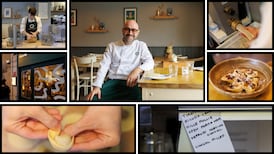Grano, the wildly popular Italian restaurant on Dublin’s northside, is many wonderful things but it is definitely not big, and it quickly becomes clear that it’s going to struggle to accommodate two people from The Irish Times standing around like eejits during dinner service.
While it is not yet 7pm, things are getting busy – and by standing in all the wrong places at all the wrong times, we’re getting in the way. So we retreat to the shadows to watch.
The kitchen, where three chefs are working quickly but calmly to produce some of the most authentic Italian food west of the European boot, is not much bigger than what you might find in a typical Irish three-bed semi, while the restaurant floor, with space for 40 diners, is no bigger than many Irish sittingrooms.
Its size, of course, is part of its charm, because what is rare is beautiful. Free tables in Grano are rare indeed.
READ MORE
The front-of-house staff and the kitchen staff weave around each other effortlessly (at least until The Irish Times breaks their rhythm) and plates move swiftly from the pass to simple wooden tables. Elenice Parente is quietly rolling pasta into thin tubes that will soon make their way on to those plates. The space the Brazilian lawyer-turned-pasta-maker is using could have been given over to another table to generate extra revenue, but her presence on the restaurant floor reminds diners that fresh pasta rolled before their eyes is central to the Grano mission. It all plays out to a soundtrack of gentle laughter and quiet jazz. It is all so mellow and gorgeous.
But all that gorgeousness takes planning.
At 10am the engine that powers Grano starts purring with just three people in the kitchen – the owner Roberto Mungo, the chef Francesco Chiodi and the pasta man Giovanni Mannino.
They talk quietly in Italian as they go about their business, prepping the fillings for the ravioli and setting up the sauces that will be central to tonight’s short and focused menu.
But by that time, one member of staff working next door in A Fianco, the wine bar Mungo opened three years after Grano in 2022, is already nearly halfway through his shift.



Pastry chef Alan Heffernan already has his first batch of focaccia and sweet treats resting on baking trays before being devoured by the 60 or so people who will be fed at Grano tonight. He is starting to work on the tiramisu.
Back in the main kitchen, a giant pot of beef shin mixed with a mountain of onions has been cooking overnight, soon to be pulped to stuff the ravioli Mannino is making from scratch.
Chiodi is marinating venison and prepping pumpkin beside a giant pasta boiler, which is next to a huge pot of simmering tomato sauce.
Grano is a restaurant built on simplicity, strong family bonds, a sense of social solidarity and community. And warm comfort food like you might find at home – if your home was a village in the south of Italy and if your family was steeped in the traditions of Calabrian cuisine.
Chiodi has been in Ireland for almost 18 years, and has been working with Mungo for the past decade, having met him in another restaurant in north Dublin. Before coming to Ireland, he worked as a chef in Rome for 15 years.
“We have never made carbonara here,” he says, although the dish is from his home city. “We do make amatriciana though, and that is almost a Roman dish. It is great here. We are a small team and we spend an awful lot of time dancing around the kitchen. We give out about each other, of course; it’s like a family that way.”
“Cooking here is a little bit like a dance all right,” says Mungo. “You have to get the rhythm just right. People might think there’s a large number of staff in here all shouting ‘Yes, chef,’ but it’s not like that at all.”
I don’t want a bigger Grano. I love the way we work. I love my team. I love what we’re doing every day
— Roberto Mungo
Mungo immigrated to Ireland from Amaroni in Calabria 17 years ago with hardly any money, and started out as a pot washer and kitchen porter. Mannino came from Italy to work as a farm hand in asparagus fields before moving into kitchens. Heffernan has a degree in zoology but a passion for baking, and spent 18 years perfecting his pastry skills in restaurants around the north of Italy, and five months working his way up in Chapter One before coming to Grano.
Mungo can scarcely believe how his fortunes have changed in recent years. He knows it’s far from a critically acclaimed restaurant in Dublin’s north inner city he was reared.
He arrived in Ireland with “very bad” English, but he worked hard to learn the language and never lost sight of his dream of opening a restaurant. His grandmother had a restaurant in Calabria which served only fresh fileja pasta and tripe, while his parents ran a delicatessen.
After serving time scrubbing pots at the sinks of various Irish kitchens, Mungo moved on to restaurant floors as a waiter and sommelier, but in his free time he learned more about food, and when he returned home to Italy to see his family he always made a point of taking cooking classes.
He also saved assiduously, and when a small space in Stoneybatter on Manor Street in Dublin 7 came up for rent in 2018, he was ready to move.



“I thought it was a lovely neighbourhood. I loved the sense of community, and my idea was to open a restaurant in the tradition that we have in Calabria. I wanted a small place with a short menu and not too many ingredients, with fresh pasta made with the ancient grains from where I am from at its heart. The idea was to give people the sense of a family dinner at home,” he says.
The doors opened on December 5th, 2018, and despite being ready to catch the pre-Christmas rush, things were hanging in the balance when the Christ Church bells welcoming 2019 rang out.
Mungo was working in the kitchen while his mother Roma – known to staff as Mamma Roma – was at a counter at the front of the restaurant, rolling out her fileja pasta all the way through the dinner service.
“Her being here was a game changer for me,” Mungo says. “Her support was very important and she was able to teach me some traditional techniques I didn’t know. I know it sounds like an Italian stereotype, bringing your mom over, but I really needed her. It was just me, her and one other person doing the serving. We couldn’t afford more staff.”
A few days in, mother and son were frazzled and fearful of the future.
“After the second week, we still didn’t have enough customers and I was wondering if it was because our menu wasn’t typically Italian,” he says. “We didn’t have things like lasagne or carbonara – the things Irish people might expect. It was very, very slow and my mom was so worried and wondering if we should change the menu. I said no, this is what we love, ‘let’s stick to the plan’.”
My mom said one day that she gave me life, and I gave life back to them with the restaurants
— Robert Mungo
And what exactly was the plan?
Mungo wanted to serve only authentic food from his home place with freshly made pasta at the heart of everything. There were just a handful of starters, mains and desserts and some carefully chosen – but unfamiliar – wines from Calabria on the menu.
While bookings weren’t stellar, those who were coming through the doors seemed happy. “The vibe on the floor was good, but it was slow,” he recalls.
Early doors, the doyen of Irish dining Darina Allen of Ballymaloe came in. “She basically ate her way through the entire menu in a single sitting. She was so happy she gave me loads of hugs when she was leaving,” he says.
Then came a review in The Irish Times in February 2019. Catherine Cleary summed Grano up: “terrific handmade, home-cooked Italian food without shortcuts.”
She noted that “comfort home cooking can’t be faked or mood-boarded into being with gingham tablecloths and Insta-friendly touches. Grano is the kind of place that won’t get distracted by trends. It’s the beloved food of childhood. That’s the kind of cooking that crosses borders and translates into great food.”
Mungo woke up the morning it was published to dozens of emails and Instagram DMs from people looking to book a table.



The year that followed was a great one for Grano, with queues out the door as people clamoured for a booking. Then Covid came and it was suddenly on the precipice again.
But another twist was yet to come.
“We knew that if we didn’t act we would not survive, so two of us would come in every day and make sauces and pasta from 7am to midnight for people to eat at home. The people of Stoneybatter really supported us. They were part of our team, part of our family. The people in the neighbourhood felt it was important to help us so we survived, we managed to break even every month and to pay the bills.”
When restaurants were allowed to reopen, Grano was more popular than it had even been.
In 2021, Mungo opened A Fianco (meaning “next to”) next door, to give people a place to have a drink while they were waiting for the table. It quickly became a place to eat in its own right. A Fianco has also given him extra kitchen space, and allowed him to move the baking and pastry elements there.
“We only serve the fresh pasta that we make. We grow our own grains in Calabria now,” he says with pride.
Starting out, he bought grain from more traditional suppliers, but ensuring it was high quality and free from pesticides was a perennial problem.
“Then one day we were having dinner and my dad said that when he was a child, his parents had a farm, and beside their farm there was a small piece of land where there was grain growing. He said the people who owned that land were stopping because nobody wanted their grain any more because of the low yields. My dad said we could take it on and grow our own.”
Mungo could scarcely believe the idea was a runner, but it worked, and the Mungos of Stoneybatter started growing ancient grains in Calabria. “I love the idea of something that was being lost being revived. And I love that we know exactly what goes into the grains now, and know there are no pesticides.”
But of as much importance to Mungo is how the growing process has strengthened the father-son bond. “For five years I have been going to the farm with my dad and we chat and look at how the grain is growing and talk about the weather, and then we work together to bring it over.”
He says food provenance is “crucial for us. We buy from people after we have eaten together and shared wine together. We see how they work, and that’s very important for us. We bring a lot of produce from Italy, but we also try and use Irish produce in season.”
Like all restaurants, Grano deals with cost of living struggles, and Mungo points to “rent, rates, electricity and everything else. There are so many small expenses every day, and I need to pay attention to it all. I can’t just cook. I have to pay attention to so many other things, from breaking plates and glasses to plumbers and all the rest.”
Would he ever be tempted to move from this small restaurant and expand the team so others take on all those day-to-day stresses, and he could sit back and watch the money roll in?
“Grano will be always be here,” he says emphatically. “I don’t want a bigger Grano. I love the way we work. I love my team. I love what we’re doing every day. I love my customers. I wouldn’t be able to do something else, you know, I love all of this – bringing ingredients in and cooking them and talking with the guys and talking with the suppliers, and bringing in the wine. Of course it can be stressful sometimes when you are short of staff or something happens, but that’s part of the game.
“I love my regulars. I live in Stoneybatter and I love the chats I have on my way to work, with the local butcher and the local barber.”
Then there was the time he had the chats with Stanley Tucci, a man who really knows his Italian food.
[ Stanley Tucci in Dublin: ‘We love Kerrygold – we have vats of it in our house’Opens in new window ]
“I was in A Fianco and was doing the baking. I heard this voice outside. I follow Stanley Tucci on Instagram and I said to myself, that sounds really like Stanley Tucci, but it couldn’t be him. What would he be doing in Stoneybatter? I went outside and it was him. He had heard about the restaurant from a friend of his in London. That blew my mind.”
Sadly, he didn’t have time to eat.
“Maybe next time,” Mungo says. “He was such a nice man and so humble. His wife told me that the journalists in Ireland who were lining up to interview him got 15 minutes. And I got 40.”
Stanley Tucci might get a table next time, but others will struggle. Grano takes bookings 90 days in advance, and Mungo admits it “can be tricky for people to plan that far ahead and book a table in time”.
But there is not much he can do about it. The restaurant is small and popular; availability is always going to be a problem. “It is good just to send an email, maybe the day before or on the day because we get cancellations. People who live in the area just pop in on the off chance. We get no-shows like every other restaurant.”
[ Pasta the Italian nonna way: ‘Spaghetti alla bolognese does not exist’Opens in new window ]
Mungo peppers his conversation with talk about his parents. “My mom and dad are very proud. When I go home we always talk a lot about the restaurant. My dad will quiz me on where I am getting the salami and how I am slicing it. He still gives me tips, because he had his food shop for 30 years. He organises the pallets for shipping. And he is on first-name terms with all the couriers. My mom said one day that she gave me life, and I gave life back to them with the restaurants, because now they are involved and we are all working together.”

















